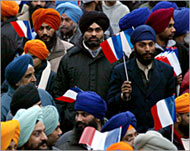French parliament to vote on hijab ban
France’s lower house of parliament is expected to adopt a controversial bill on Tuesday that will ban Muslim headscarves and other religious symbols in state schools.

This is so, despite opposition from minorities and some international rights groups.
The National Assembly was due to hold its vote on the government-sponsored bill at 1515 GMT after three days of debate last week.
If the measure is adopted, the draft law will pass to the upper house of parliament, the Senate, for another vote.
President Jacques Chirac’s centre-right Union for a Popular Majority dominates both houses of parliament, making passage of the bill very likely.
Chirac himself has come out in favour of the law, which would make it illegal to wear clothes or insignia that “conspicuously” display religious affiliation in state schools. It would apply to headscarves worn by Muslim girls, skull caps worn by Jewish boys, and “large” Christian crosses.
Secularity
 |
|
Sikhs living in France are also |
The government hopes the law will uphold France’s tradition of secularity – a strict separation of church and state that it argues promotes an ideal of French republicism and brings together citizens from different backgrounds by filtering out religious differences.
But members of France’s five million strong Muslim population have held demonstrations against the bill, as have some of the generally discreet 7000 Sikhs living in the country who fear their traditional turbans will be banned.
Some foreign organisations have also interpreted the move to be more a blow to religious freedom.
Rights violation
On Monday, the International Helsinki Federation for Human Rights, based in Austria, said it was against the French bill because it believed it violated human rights.
“The law would contradict the conventions on human rights and violate the international standards that France has agreed and sometimes contributed to create,” the head of the group, Aaron Rhodes, said.
 |
|
French PM Jean Pierre Raffarin |
“I don’t think it will help the reconciliation between religious communities,” he said.
A US group, the Commission on International Religious Freedom, which advises Congress, the White House and State Department, said last week it, too, believed the proposed law could violate international human rights standards.
It called for Washington to urge Paris to reconsider the legislation in light of French commitments and obligations under international treaties to uphold and promote religious freedoms.
“These restrictions, if enacted, may violate France’s international commitments… under which each individual is guaranteed the freedom to manifest religion or belief, in public as well as in private,” committee chairman Michael Young said in a statement.
‘Inflame tensions’
London mayor Ken Livingstone has also written to French Prime Minister Jean-Pierre Raffarin urging him to scrap the plan, saying: “I believe that a move to ban the hijab and other religious symbols in state schools will inflame current tensions between communities and encourage attacks on minority communities, not only in France but also more widely in Europe.”
|
“The law would contradict the conventions on human rights and violate the international standards that France has agreed and sometimes contributed to create” Aaron Rhodes, |
Last month, Saudi Arabia’s highest religious authority, grand mufti Shaikh Abd al-Aziz al-Shaikh, said that “interfering in the affairs of Muslims regarding the headscarf is an infringement on the human rights that they (French) say they are defending.”
In an effort to dampen some of the criticism, the French government has agreed to two amendments put forward by the left-wing opposition that would require schools to go through a period of mediation before punishing a student deemed in violation of the law and setting in place a mandatory review of the law after one year.
France’s teachers, many of whom complain on unruly classrooms in urban areas with large immigrant populations from former North African colonies, strongly back the law.